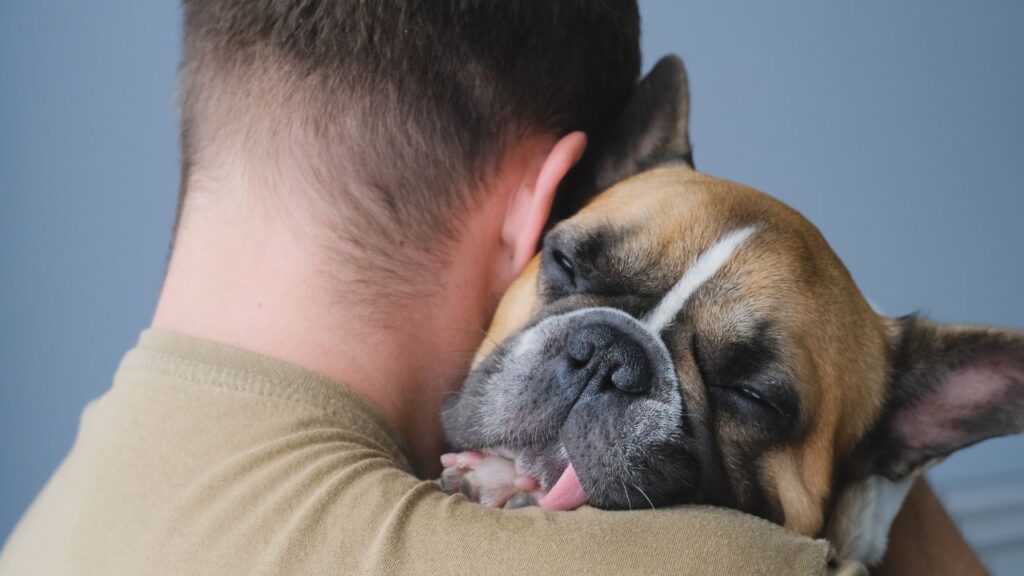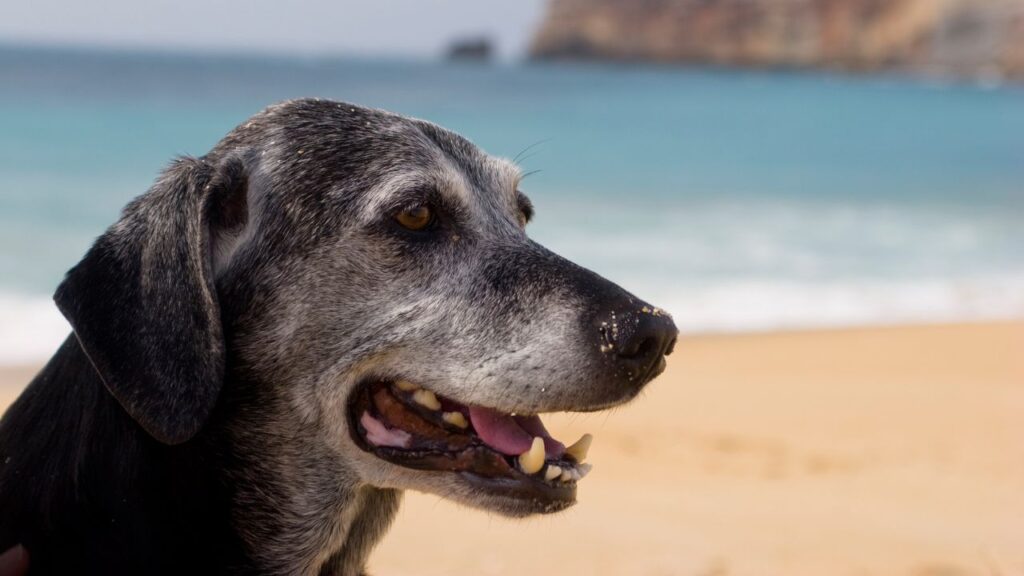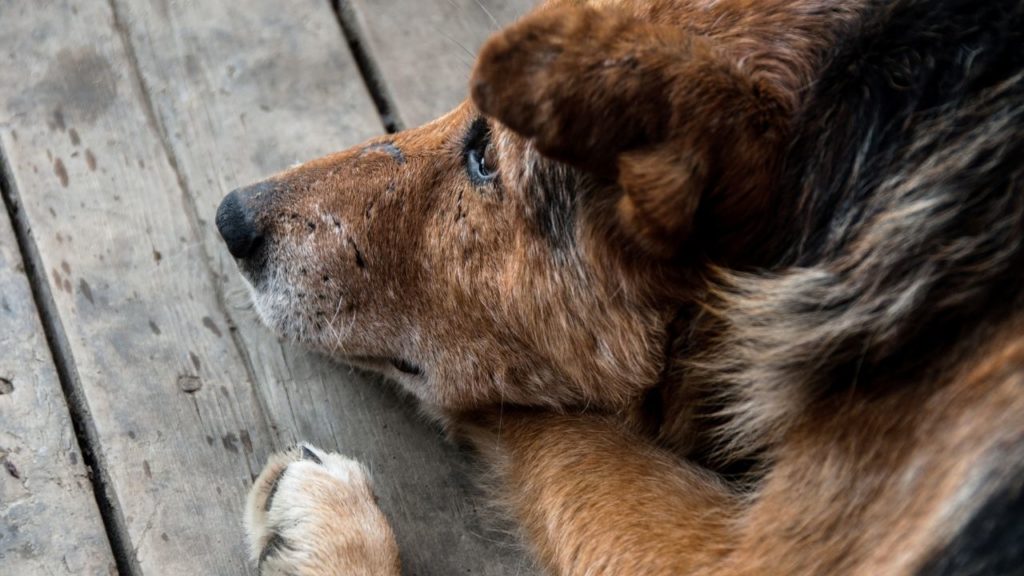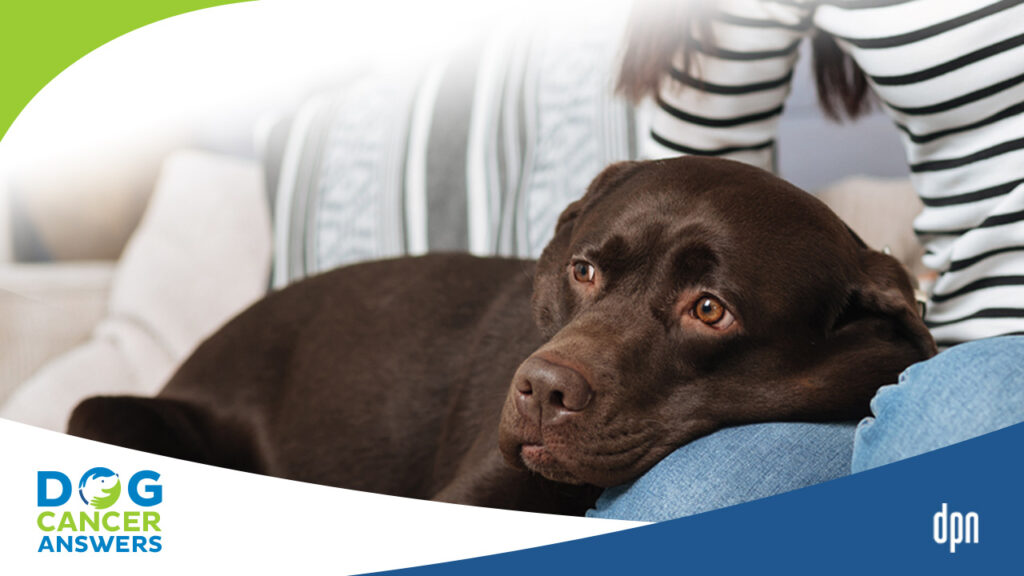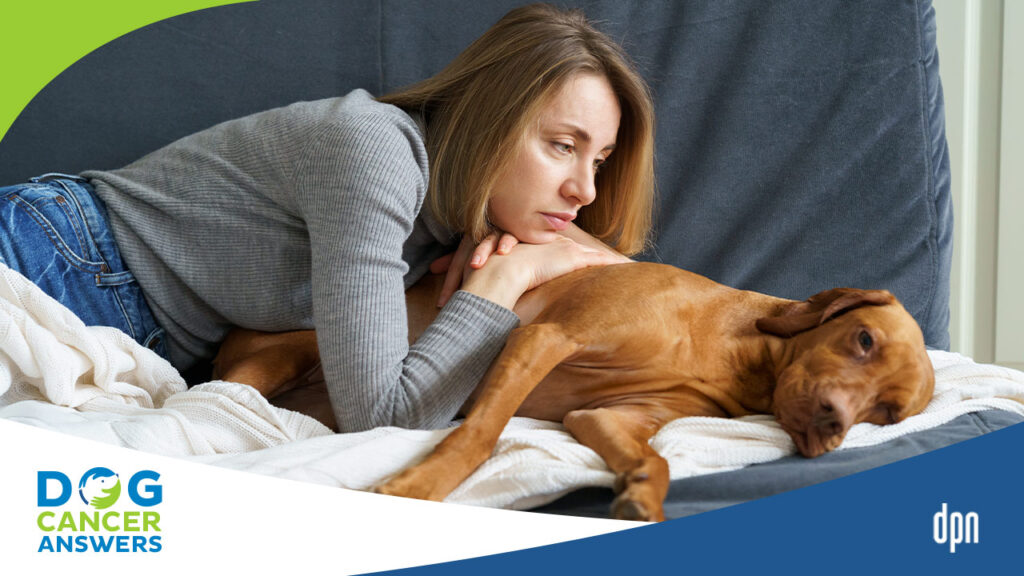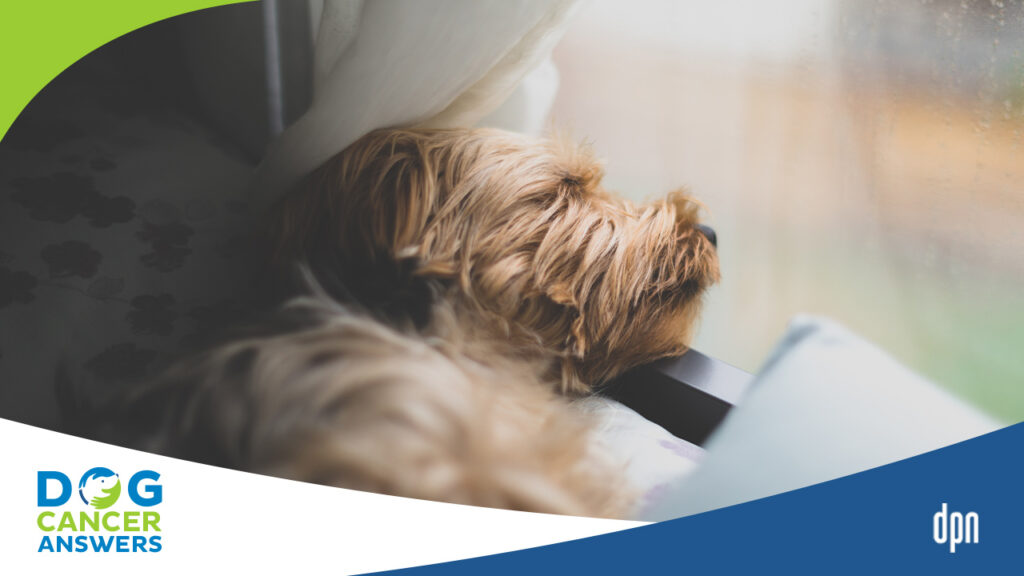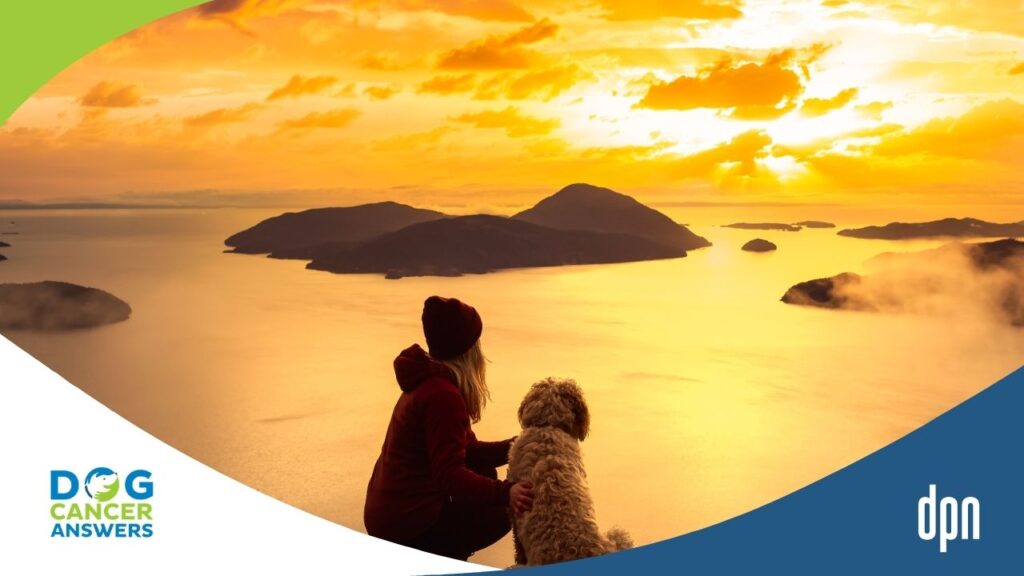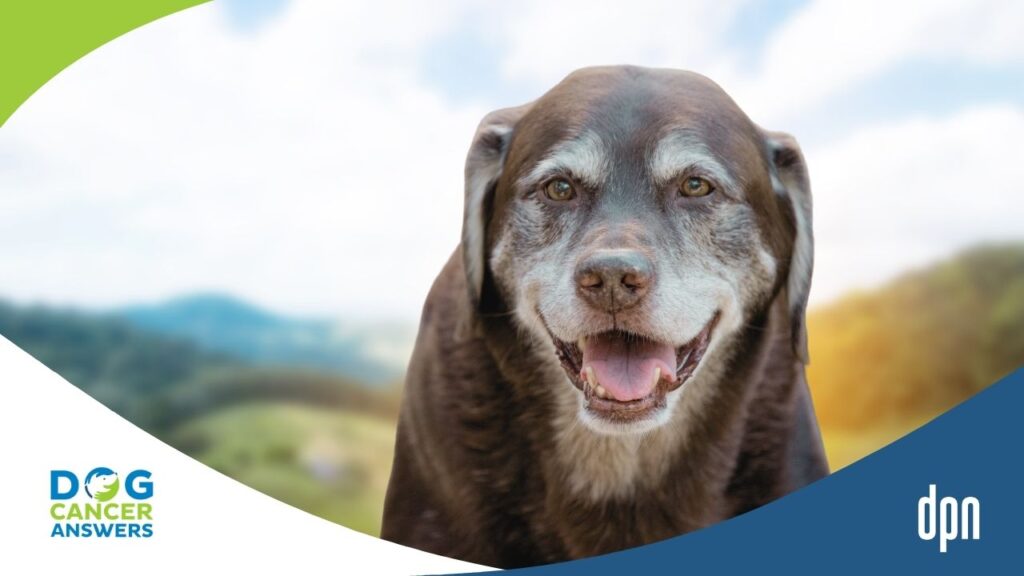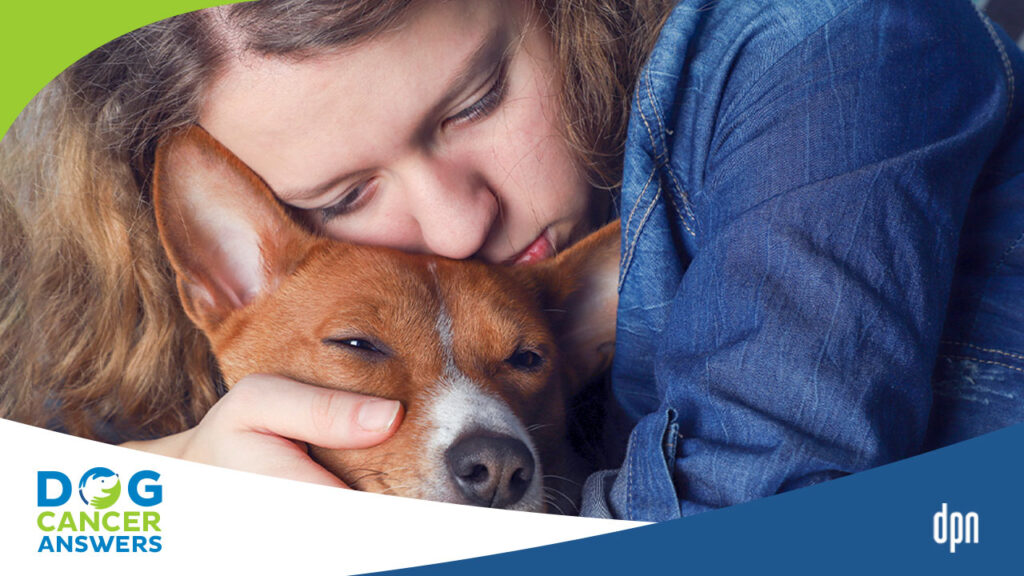Molly Jacobson: Death is unique to each individual and you can’t always predict what it will be like.
Announcer: Welcome to Dog Cancer Answers, where we help you help your dog with cancer.
Molly Jacobson: Hi dog lovers, I’m Molly Jacobson. I’m the editor in chief over at DogCancer.com where science writers, veterinarians, and cancer researchers give you better information today, so you have no regrets tomorrow.
If you’re trying to decide between dog euthanasia and natural death, I’m going to tell you what your veterinarian may not, because it’s probably too hard for them to say in person, and it’s probably too hard for you to hear in person. I want to talk about dogs dying naturally versus euthanasia. And I want to tell you the plain truth, as I understand it, and I have experienced it.
I want to make this really short because it’s a terrible subject to talk [00:01:00] about, and I know that if you’re contemplating that decision, it’s not a comfortable time for you, and it’s very, very hard. So first I always have to say, I am not a veterinarian, and this is not medical advice. I’m just a dog mom like you, but I’ve been writing about and thinking about and researching cancer since 2007. So I guess I’m a knowledgeable layperson.
Okay, back to euthanasia. If you’re thinking about it, I’ve been there myself and here’s my dog cancer tip for today. Don’t think of euthanasia as giving up on your dog or as choosing the moment of your dog’s death. You can’t, actually, choose the moment of death anyway.
That’s impossible because dying is a process. It’s not a moment in time. It’s a process that itself happens in stages. And it doesn’t happen all at once, unless it’s a real emergency like you’re hit by a car. [00:02:00] Especially when the cause of death is chronic, like cancer, dying happens little by little over days or weeks or sometimes even months. For example, organs, as they start to fail, they fail little by little over time and the results might not even show up on blood tests right away.
So if you are being offered euthanasia by your veterinarian. If they are saying better one day too late than one day too early, what they’re really talking about is not choosing the moment of death specifically, as much as being able to control the circumstances of your dog’s dying process which is happening in stages.
I don’t know if you’ve ever sat at the bedside of someone, a human or an animal, who is dying. We imagine that what we’ll see is a very loving and peaceful [00:03:00] experience where the breaths just get softer. and fainter, and then they’ll just stop, and we’re with them, and it’ll be very sweet, like it is in the movies.
Or we imagine a natural death is finding our dog curled up in their favorite sunbeam, and they’ve died in their sleep, and that’s a lovely thing, and it does happen, and it’s happened in my life. I’ve seen that. But just as every birth is unique, So is every death. Think about that, just for a second. Ask a mother, a midwife, or any doctor who’s seen more than one birth and they’ll tell you they are not all the same. It’s unique to the individual.
And death is also unique. It’s unique to each individual. And you can’t always predict what it will be like. I can tell you that every death I’ve seen or been present for has been very different from every other death. And [00:04:00] being able to coerce or change the circumstances of the death so that they’re as comfortable as possible is what veterinarians are really offering you when they offer you euthanasia.
Because here’s what many won’t say to an upset dog lover who’s already overwhelmed, already grieving, and this is like the worst day of their life, because I know it has been for me. What many veterinarians will not tell you is that a natural death does not equal an easy death. It does not equal a peaceful death. And it does not equal a pain free death. Death can be painful, and because it happens in stages over a long period of time, It can be long and painful.
If your veterinarian is offering you euthanasia, it’s because they think this process of dying is already underway. I need to break here so we can take a listen to our sponsors, [00:05:00] but we’ll be right back with more thoughts on whether we can reverse that dying process.
Hi again, dog lover. We’re back. So let’s just talk for a moment about what that first thought is when we realize that the dying process may have already begun. When it comes to humans, and dogs, we look for ways to maybe reverse it, right? Like organs can sometimes recover their function enough to give us more high quality life. That may be the case for your dog.
I’m not telling you to give up on your dog. What I’m telling you is that there is a point past which it’s hard to reverse and another point past which it’s impossible to reverse. And when it comes to humans, we offer as many comfort drugs as possible when we realize we’re past that point, right?
We offer as many comfort drugs as possible to those who are in their dying process [00:06:00] because it can be very hard. It hurts, so we don’t want them to suffer So we offer things like morphine and the little button that they can give a little bit more when they need to up to a point. That’s because every cell in the body fights to live. That’s what it does.
So death is a struggle by definition, and every struggle is unique to that person, that individual, that dog. And struggle, by definition, is hard and stressful, both for the animal and for you. And so euthanasia, where first we put the dog into a deep sleep so they’re not aware of anything, and then inject a barbiturate, an agent that stops the heart very quickly and without a lot of drama.
It just stops it. It stops the heart, so they’re already asleep and they’re not feeling anything. They’re not aware of what happens when the moment of [00:07:00] death is here and we’re sparing them suffering. No death is kind. I’ve been in the presence of dogs who’ve died naturally and I’ve been in the presence of those who’ve died of euthanasia.
Neither are easy to witness for me, and I would not choose for anybody to die if I had my magic wand operational, which I don’t. I offer this perspective to you as just something to consider when you’re thinking about your dog’s inevitable death. It’s hard truth, isn’t it? That death is inherently a struggle, and almost always painful in some way.
And it happens over a long period of time, or it can, and not just in the moment that the heart stops. So when you’re thinking, oh, is it too soon or too late? Remember, you can’t choose that moment anyway. Even if you make an appointment for euthanasia, and go through that whole process, there’s nothing about that where you’re [00:08:00] choosing the exact minute that the heart stops beating.
The heart stops beating when the heart stops beating. That is unique to your dog. So rather than thinking is it too soon or too late, the real question, or the question that I suggest that you think about, is how much control do I have? And is there anything I can do to increase the level of control? That’s what your veterinarian is really offering when you’re being offered euthanasia. Some degree of control over the circumstances in which your dog’s death happens.
I’m not going to tell you my death stories because, honestly, I don’t think that’s possible. Whether by euthanasia or by natural death, the miracle of death, and I do experience it as a miracle, it’s the passing of great souls from the physical body. That is Just awesome in the original sense of the word. It fills me with [00:09:00] awe. And, um, I cannot really put it into words. I don’t have the words to convey it.
I can only tell you that the pain and trauma of losing someone you love at the moment of death is enough pain and trauma for both of you. All the other suffering that might come along with a natural death might be optional. If you can avoid suffering, it’s worth thinking about it. And because death happens in stages, not all at one time, you might think of this as a time when your dog is already started on their process and you are simply easing their passage.
You are simply helping them to make their last breaths, their last heartbeats. more comfortable, and less of a struggle. I personally find comfort, and this is my own thing, I personally find comfort in knowing that my dog’s pain and [00:10:00] struggle will end at death, even though my pain and struggle will continue increase even as I mourn my dog.
You know, I don’t think mourning ever really ends. It just gets easier to bear. I know that I’m still mourning my dog, Laurie, who died in childbirth when I was only three years old. But it comforts me to know that Laurie and my dogs and my humans who have died. In my mind, they’re all somewhere together, smiling at me right now, and encouraging me as I deliver this hard message. It’s hard for me to say, and I’m sure it’s hard for you to listen to.
Anyway, that’s what I can tell you. As a fellow dog mom and someone who knows this pain, your veterinarian might not be able to say these things so directly to you because they are such hard truths to say directly to someone’s face, [00:11:00] especially in a professional venue.
But we do our best, me and my fellow writers, and veterinarian friends over at DogCancer.com to tell those hard truths and I hope you’ll take good care of yourself during this time. We’re all thinking of you. I hope you’ll give your dog a cuddle from me and if you would like to reach out, please join us in our Facebook support group.
I’m Molly Jacobson and for all of us here at Dog Podcast Network, I’m wishing you and your dog a very warm aloha.
Announcer: Thank you for listening to Dog Cancer Answers. If you’d like to connect, please visit our website at DogCancer.com or call our listener line at (808) 868-3200. And here’s a friendly reminder that you probably already know, this podcast is provided for informational and educational purposes only. It’s not meant to take the place of the advice [00:12:00] you receive from your dog’s veterinarian.
Only veterinarians who examine your dog can give you veterinary advice or diagnose your dog’s medical condition. Your reliance on the information you hear on this podcast is solely at your own risk. If your dog has a specific health problem, contact your veterinarian. Also, please keep in mind that veterinary information can change rapidly, therefore, some information may be out of date.
Dog Cancer Answers is a presentation of Maui Media in association with Dog Podcast Network.

